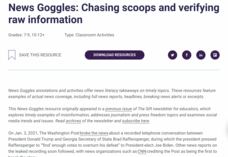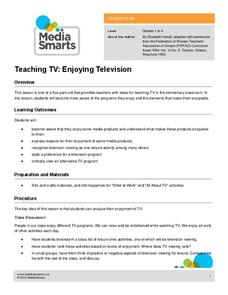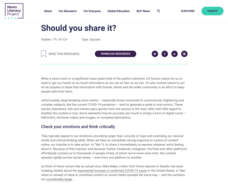Curated OER
Fighting Fake News
Fake news. Alternative facts. Internet trolls. In an age of Newspeak, it's increasingly important to equip 21st century learners with the skills needed to determine the legitimacy of claims put forth on social media, in print, and in...
TED-Ed
How to Choose Your News
How do you get the truth unfiltered by middlemen? Tune into various sources and note the differences is the suggestion in a short video that begins by providing examples of how media gatekeepers have manipulated information and how those...
Crabtree Publishing
Why Does Media Literacy Matter?
Criticism of news and entertainment journalism is at an all-time high. Help 21st-century learners develop the media literacy skills they need to become critical consumers with a three-lesson guide the looks at persuasive techniques used...
ReadWriteThink
Critical Media Literacy: Commercial Advertising
Commercial advertising—we can't get away from it, but do we realize just how often we are being advertised to? With this lesson plan, scholars analyze mass media to identify how its techniques influence our daily lives. Learners browse...
MENSA Education & Research Foundation
Media Literacy
Young learners today are bombarded by media manipulation. Help them develop the skills they will need to become savvy 21st century media consumers with a unit on media literacy.
News Literacy Project
Fighting Falsehoods on Social Media
It's time to stop misinformation in its tracks. Scholars take an online quiz to see how well they understand social media platforms' policies on spreading false information. After taking the quiz, pupils receive a score with an...
Museum of Tolerance
Developing Media Literacy
To protect young people from questionable content, many schools limit access. This resource suggests that because learners can so readily avail themselves to unrestricted Internet access, it is vital for 21st century learners to develop...
PBS
Technology: Conveniences and Consequences
It's a delicate balance—using technology to improve our lives while still protecting the environment, and ourselves, from the hazards of technology use. Class members examine statistics about the increase in media use, complete a survey...
News Literacy Project
News Goggles: Lionel Ramos, Oklahoma Watch
Given all the recent criticism of the news media and coverage, it's crucial that young people are given the tools they need to evaluate what they see, hear, and read about current events. A video interview from "News Goggles" introduces...
News Literacy Project
News Goggles: Covering a Newsworthy Trial
The trial of Derek Chauvin, former Minneapolis police officer charged in the death of George Floyd, is the focus of a lesson that asks pupils to compare how local, nationial, and international news organizations reported the testimony of...
Common Sense Media
Digital Compass
Time to make some real world decisions in an interactive digital citizenship game. Choose a story and help the characters make the right decisions regarding Internet safety, cyberbullying, copyright, media literacy, appropriate online...
News Literacy Project
News Goggles: Chasing Scoops and Verifying Raw Information
A 23-slide presentation teaches young media analysts how to identify a scoop or exclusive first report of a breaking story, how these reports become verified, and how subsequent reports in other news sources add information or refocus...
Facebook
Online Presence
What happens when an online post gets the wrong kind of attention? Learners evaluate the good, the bad, and the occasionally ugly side of social media posting with a instructional activity from a vast digital citizenship series. After...
News Literacy Project
News Goggles: Tracking Developing Stories
A 28-slide presentation introduces viewers to the process reports go through to track and verify developing news stories. Using the reports of the attacks at Atlanta, Georgia, massage parlors as an example, viewers are taught what to...
News Literacy Project
Story Explorers: Evaluate News Coverage
What makes an issue or event newsworthy? Scholars complete a K-W-H-L chart based on a recent news event. As they complete the chart, small groups collaborate to analyze coverage of the story or event.
Media Smarts
Teaching TV: Enjoying Television
What makes a TV program enjoyable? As an introduction to media analysis, kids identify their favorite programs and the elements they find engaging.
News Literacy Project
Get Smart About COVID-19
Pandemic or infodemic? Scholars complete an online quiz to determine if they can sort fact from fiction related to COVID-19 information. Pupils view a variety of news articles, social media posts, and video clips to practice identifying...
J. Paul Getty Trust
Exhibiting Common Threads
Artists working in different media often explore the same themes—to model how these same themes weave their way through different forms of artistic expression, scholars analyze images by Dorothea Lange, identifying key themes in her...
News Literacy Project
Fact-Check It!
Here's a lesson designed to help learners develop their digital verification skills. First, expert groups study specific digital verification skills, and in a jigsaw activity, share what they have learned with classmates. The jigsaw...
News Literacy Project
News Goggles: Identifying the News Source
A 25-slide presentation teaches viewers how to identify the source of stories in newspapers and online news sites. The slides show how to locate the byline where either the reporter's name or the wire service that provided the story can...
Media Smarts
Teaching TV: Television Techniques
As part of a five-lesson plan unit on how television uses technology and film techniques to communicate meaning, elementary students create their own media productions that demonstrate their understanding of these concepts.
Special Olympics
Train at School
Here is a fantastic compilation of adaptive physical education lesson plans that cover the major concepts of physical fitness, including: aerobic endurance, balance, coordination, flexibility, power, speed and agility, and strength.
Star Wars in the Classroom
"Shakespeare and Star Wars": Lesson Plan Day 12
Class members compare the final 30 minutes of Lucas's Star Wars: A New Hope with Act V of Doescher's play, William Shakespeare's Star Wars: Verily, A New Hope and consider how the choice of media influences viewers' impression of the...
News Literacy Project
Should You Share It?
Sharing isn't always caring. Scholars learn how to reduce the spread of misinformation on the Internet. They take an online quiz of example posts targeted to a specific audience. Using critical thinking skills, they see if they can tell...
Other popular searches
- Education News
- Media Education Propaganda
- Media Education Esl
- Lesson on Media Education
- On Line Media Education
- Media Education Lesson Plans
- Media Education Tabloid
- Online Media Education
- Media Education Math
- Media Education Blogging
- Media Education Art Projects
- Media Education Blagging

























